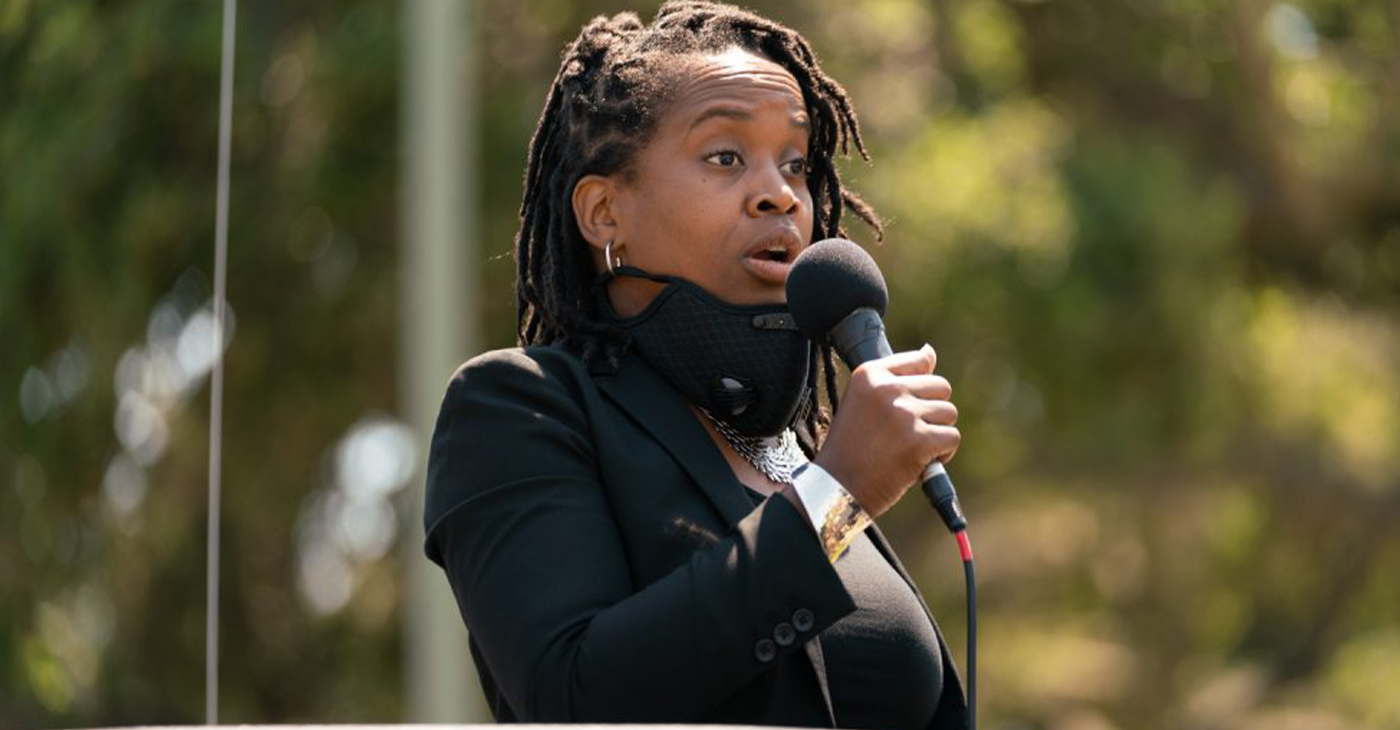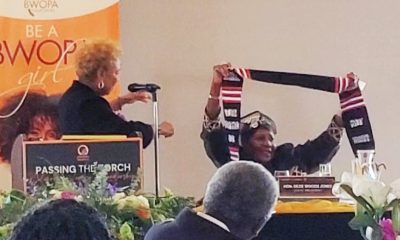City Government
Council Adopts Kaplan’s $3.2 Billion Budget

Bas wins $12 million for Community Land Trust affordable housing fund
Voting Tuesday night, the Oakland City Council adopted a two-year, $3.2 billion budget, partially resolving the ongoing political fight with Mayor Libby Schaaf’s administration over how much of the city’s income will be directed toward services for residents and wages for the city workers who deliver many of those services.
The new budget, named the “Oakland Together” budget, directs $87 million to priorities identified by council members and supported by community members and groups, including the ReFund Coalition, which represents a number of community organizations and city worker unions.

Rebecca Kaplan
Council President Rebecca Kaplan, who had faced attacks from Mayor Libby Schaaf and the media for her leadership in producing the Oakland Together budget, told the Oakland Post she was pleased with what was in the new spending package but that several key issues were still unresolved.
“Even though many, many great items were included in the budget we passed (Tuesday) night, I’m not celebrating yet because we are still working to finish up some very important final items, specifically, resolving the (funding) situation with our workforce development funding and issues of our own city workers.”
In a statement to the Post, Mayor Schaaf said, “I’m grateful our City Council kept the administration’s proposal as the framework for the budget it unanimously adopted last night. The last-minute augmentations still warrant close review, yet I’m pleased the Council’s unified action will allow us to make unprecedented investments in homelessness and affordable housing and to start a historic road-paving plan on July 1.”
The City Council’s changes in the Schaaf administration budget included:
• A study of Cahoots, a program that would utilize mental health workers to respond to mental health crises instead of police;
• Remove the Mayor’s proposal to cut parks maintenance workers, which would have primarily impacted parks in flatland neighborhoods;
• Conduct an audit of the Oakland Police Department, which would examine police overtime costs;
• Substantial increase of homeless services;
• Some additional funding for the Private Industry Council and other workforce development;
• East Oakland healthy corner store conversions;
• Public bathrooms;
• Evening hours for permits at Planning and Building so small property owners can get timely approval of projects.

Nikki Fortunato Bas
Councilmember Nikki Fortunato Bas said in a statement that she was pleased the council passed her proposal, the Preservation of Affordable Housing Fund (PAHF), to allocate $12 million to create a municipal fund for community land trusts and limited equity housing cooperatives to take housing off of the speculative market by acquiring and preserving rental properties with 25 or fewer units.
“This fund is a bold investment in a visionary solution that…puts (properties) permanently in the hands of Oaklanders,” said Fortunato Bas, who developed the proposal with local grassroots organizations Alliance of Californians for Community Empowerment (ACCE) Action and Oakland Community Land Trust (OakCLT).
She emphasized that the new budget also includes programs to address Oakland’s housing, displacement, and homelessness crises, including hiring a mobile outreach team and full-time administrator focused on homelessness, creating homeless navigation centers, and expanding direct legal and emergency rent assistance for tenants.
“Our longtime neighbors are being pushed out while thousands of luxury housing units are being developed. This budget is a huge systemic opportunity to fix a crisis that is everywhere we look and only getting worse,” said Fortunato Bas. “We can’t solve it by tinkering at the margins, dedicating resources only a fraction the size of the challenges we face.”
Carroll Fife, director of Oakland ACCE and part of the Refund Oakland Community and Labor Coalition, told the Post that the coalition had realized many of the demands they had sought to achieve this year, “from funds for affordable housing and anti-displacement to additional resources to address the city’s illegal dumping epidemic.”
However, she said “There is a great deal of work to do. One budget cycle will not rectify the years of disinvestment that have impacted our most disenfranchised residents.”
Fife also called on people to support city workers in their fight for a pay raise and the filling of vacant jobs. “Vacancies in Housing and Community Development, Public Works and the Sewer department, to name a few, have direct and immediate repercussions on the entire city,” she said.
Former mayoral candidate Cat Brooks told the Post, “This is the most progressive budget Oakland has ever passed. It’s a big step in the right direction.”
But “It still does not go far enough in terms of divesting some monies from the bloated police budget and redirecting those dollars to critical needs for Oakland that actually keep us safe,” she said.
Alameda County
Oakland Council Expands Citywide Security Cameras Despite Major Opposition
In a 7-1 vote in favor of the contract, with only District 3 Councilmember Carroll Fife voting no, the Council agreed to maintain its existing network of 291 cameras and add 40 new “pan-tilt-zoom cameras.”

By Post Staff
The Oakland City Council this week approved a $2.25 million contract with Flock Safety for a mass surveillance network of hundreds of security cameras to track vehicles in the city.
In a 7-1 vote in favor of the contract, with only District 3 Councilmember Carroll Fife voting no, the Council agreed to maintain its existing network of 291 cameras and add 40 new “pan-tilt-zoom cameras.”
In recent weeks hundreds of local residents have spoken against the camera system, raising concerns that data will be shared with immigration authorities and other federal agencies at a time when mass surveillance is growing across the country with little regard for individual rights.
The Flock network, supported by the Oakland Police Department, has the backing of residents and councilmembers who see it as an important tool to protect public safety.
“This system makes the Department more efficient as it allows for information related to disruptive/violent criminal activities to be captured … and allows for precise and focused enforcement,” OPD wrote in its proposal to City Council.
According to OPD, police made 232 arrests using data from Flock cameras between July 2024 and November of this year.
Based on the data, police say they recovered 68 guns, and utilizing the countywide system, they have found 1,100 stolen vehicles.
However, Flock’s cameras cast a wide net. The company’s cameras in Oakland last month captured license plate numbers and other information from about 1.4 million vehicles.
Speaking at Tuesday’s Council meeting, Fife was critical of her colleagues for signing a contract with a company that has been in the national spotlight for sharing data with federal agencies.
Flock’s cameras – which are automated license plate readers – have been used in tracking people who have had abortions, monitoring protesters, and aiding in deportation roundups.
“I don’t know how we get up and have several press conferences talking about how we are supportive of a sanctuary city status but then use a vendor that has been shown to have a direct relationship with (the U.S.) Border Control,” she said. “It doesn’t make sense to me.”
Several councilmembers who voted in favor of the contract said they supported the deal as long as some safeguards were written into the Council’s resolution.
“We’re not aiming for perfection,” said District 1 Councilmember Zac Unger. “This is not Orwellian facial recognition technology — that’s prohibited in Oakland. The road forward here is to add as many amendments as we can.”
Amendments passed by the Council prohibit OPD from sharing camera data with any other agencies for the purpose of “criminalizing reproductive or gender affirming healthcare” or for federal immigration enforcement. California state law also prohibits the sharing of license plate reader data with the federal government, and because Oakland’s sanctuary city status, OPD is not allowed to cooperate with immigration authorities.
A former member of Oakland’s Privacy Advisory Commission has sued OPD, alleging that it has violated its own rules around data sharing.
So far, OPD has shared Flock data with 50 other law enforcement agencies.
Activism
Black Arts Movement Business District Named New Cultural District in California
Located in the heart of District 3, the BAMBD is widely regarded as one of the nation’s most important centers of Black cultural production — a space where artists, entrepreneurs, organizers, and cultural workers have shaped generations of local and national identity. The state’s recognition affirms the district’s historic importance and its future promise.

By Post Staff
Oakland’s Black Arts Movement Business District (BAMBD) has been selected as one of California’s 10 new state-designated Cultural Districts, a distinction awarded by the California Arts Council (CAC), according to a media statement released by Councilmember Carroll Fife.
The BAMBD now joins 23 other districts across the state recognized for their deep cultural legacy, artistic excellence, and contributions to California’s creative economy.
Located in the heart of District 3, the BAMBD is widely regarded as one of the nation’s most important centers of Black cultural production — a space where artists, entrepreneurs, organizers, and cultural workers have shaped generations of local and national identity. The state’s recognition affirms the district’s historic importance and its future promise.
“This designation is a testament to what Black Oakland has built — and what we continue to build when we insist on investing in our own cultural and economic power,” said Fife.
“For years, our community has fought for meaningful recognition and resources for the Black Arts Movement Business District,” she said. “This announcement validates that work and ensures that BAMBD receives the support it needs to grow, thrive, and continue shaping the cultural fabric of California.”
Since taking office, Fife has led and supported multiple initiatives that strengthened the groundwork for this achievement, including:
- Restoring and protecting arts and cultural staffing within the City of Oakland.
- Creating the West Oakland Community Fund to reinvest in historically excluded communities
- Advancing a Black New Deal study to expand economic opportunity for Black Oakland
- Ensuring racial equity impact analyses for development proposals, improving access for Black businesses and Black contractors
- Introduced legislation and budget amendments that formalized, protected, and expanded the BAMBD
“These efforts weren’t abstract,” Fife said. “They were intentional, coordinated, and rooted in a belief that Black arts and Black businesses deserve deep, sustained public investment.”
As part of the Cultural District designation, BAMBD will receive:
- $10,000 over two years
- Dedicated technical assistance
- Statewide marketing and branding support
- Official designation from Jan. 1, 2026, through Dec. 31, 2030
This support will elevate the visibility of BAMBD’s artists, cultural organizations, small businesses, and legacy institutions, while helping attract new investment to the district.
“The BAMBD has always been more than a district,” Fife continued. “This recognition by the State of California gives us another tool in the fight to preserve Black culture, build Black economic power, and protect the families and institutions that make Oakland strong.”
For questions, contact Councilmember Carroll Fife at CFife@oaklandca.gov.
Activism
Oakland School Board Grapples with Potential $100 Million Shortfall Next Year
The school board approved Superintendent Denise Saddler’s plan for major cuts to schools and the district office, but they are still trying to avoid outside pressure to close flatland schools.

By Post Staff
The Oakland Board of Education is continuing to grapple with a massive $100 million shortfall next year, which represents about 20% of the district’s general fund budget.
The school board approved Superintendent Denise Saddler’s plan for major cuts to schools and the district office, but they are still trying to avoid outside pressure to close flatland schools.
Without cuts, OUSD is under threat of being taken over by the state. The district only emerged from state receivership in July after 22 years.
“We want to make sure the cuts are away from the kids,” said Kampala Taiz-Rancifer, president of the Oakland Education Association, the teachers’ union. “There are too many things that are important and critical to instruction, to protecting our most vulnerable kids, to safety.”
The school district has been considering different scenarios for budget cuts proposed by the superintendent, including athletics, libraries, clubs, teacher programs, and school security.
The plan approved at Wednesday’s board meeting, which is not yet finalized, is estimated to save around $103 million.
Staff is now looking at decreasing central office staff and cutting extra-curricular budgets, such as for sports and library services. It will also review contracts for outside consultants, limiting classroom supplies and examine the possibility of school closures, which is a popular proposal among state and county officials and privatizers though after decades of Oakland school closures, has been shown to save little if any money.
-

 Activism4 weeks ago
Activism4 weeks agoOakland Post: Week of November 19 – 25, 2025
-

 #NNPA BlackPress3 weeks ago
#NNPA BlackPress3 weeks agoLIHEAP Funds Released After Weeks of Delay as States and the District Rush to Protect Households from the Cold
-

 Alameda County3 weeks ago
Alameda County3 weeks agoSeth Curry Makes Impressive Debut with the Golden State Warriors
-

 Activism3 weeks ago
Activism3 weeks agoOakland Post: Week of November 26 – December 2, 2025
-

 #NNPA BlackPress3 weeks ago
#NNPA BlackPress3 weeks agoSeven Steps to Help Your Child Build Meaningful Connections
-

 #NNPA BlackPress4 weeks ago
#NNPA BlackPress4 weeks agoBeyoncé and Jay-Z make rare public appearance with Lewis Hamilton at Las Vegas Grand Prix
-

 #NNPA BlackPress3 weeks ago
#NNPA BlackPress3 weeks agoSeven Steps to Help Your Child Build Meaningful Connections
-

 #NNPA BlackPress3 weeks ago
#NNPA BlackPress3 weeks agoTrinidad and Tobago – Prime Minister Confirms U.S. Marines Working on Tobago Radar System




















































